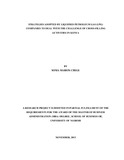| dc.description.abstract | The energy sector is considered a key enabler to achieving vision 2030 and LPG has been
seen as a vital source of energy in response to growing concerns of urban air pollution
and greenhouse gases. LPG is one of the few consumer products sold in a metal cylinder
whereas in its distribution, many parties may handle this cylinder before it reaches the
customer. Once the LPG cylinder is sold the cylinder owner may not have direct control
over its subsequent use making it important to maintain the cylinder integrity throughout
the distribution chain as an integral part of customer safety. However, some unscrupulous
players elect to illegally fill the cylinders owned by others and pay little or no attention at
all to the procedures for filling and handling LPG and related equipment. This exposes
the cylinder owner to the risk that the misuse of the cylinder could result in injury, loss or
damage to property ad loss of customer business which can expose the cylinder owner to
severe liability claims, damage the reputation of the owner and that of the industry. This
study sought to establish challenges, strategies and measures which have been taken to
control cross-filling activities in the LPG market. The study collected data from the oil
marketing companies which deal with LPG refilling in Kenya. The data was collected
using semi-structured questionnaire and was analyzed using descriptive statistics. The
study found that LPG companies face challenges such as loss of gas cylinders, cross
filling, inability to trace movement of the cylinders, unfair competition from the illegal
refillers who refill the gas cylinders at cheap prices, high costs of refilling, heavy taxation
from the government, and safety threats to the end-users. Some strategies used to deal
with the challenges include: use of self-sealing valves, RFID technologies to provide
cylinder tracking solutions, frequent audits and monitoring of the licensed LPG dealers,
assigning legal responsibility for cylinder maintenance and clear definition of the owners
of the cylinders. Other measures taken to control cross-filling activities in the oil market
are ban of cross-filling of different suppliers, registration of the companies that refill and
inspect gas cylinders and enforcement of the penalties to companies using unsafe
cylinders. | en |

